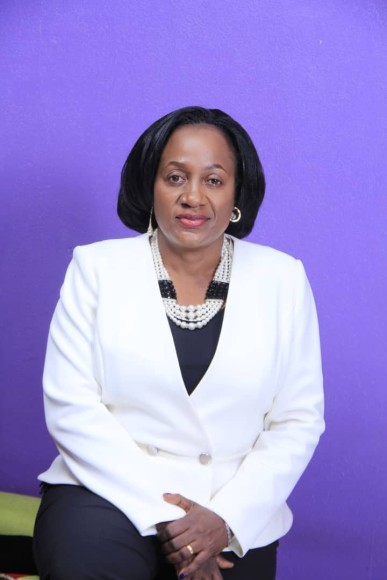Yunia Musaazi wants more women in water committees: 'Women know what they're talking about'
Text: Anne Dirks
As director of the umbrella organisation of water NGOs in Uganda, Yunia Musaazi has been stressing the importance of water and sanitation for fifteen years. And she does so with a particular eye for women. "Ultimately, it is women who pay the highest price for the climate crisis. It is women who are the first to be affected. That's why we need to take action now."

"A lot of people don't realize what's involved when it comes to water and sanitation. It sounds so simple. But very many people do not have access to clean drinking water and sanitation. There are 45 million people living in Uganda. Of those 45 million people, 4 million people don't have access to clean water and more than 8 million people don't have access to sanitation.
That's a big problem," says Yunia Musaazi, executive director of the Uganda Water and Sanitation Network, also known as UWASNET, a non-governmental organisation dedicated to ensuring access to clean water and sanitation for all Ugandans.
We need to give this issue more priority
UWASNET does this by connecting and collaborating with social enterprises, development programmes, businesses and NGOs in the sector. UWASNET is also an important strategic partner of Simavi. "I've been working in the water sector for more than fifteen years now, and actually for fifteen years it's been the same message: we need to give this issue more priority, at the national level as well as globally, more money needs to go to it so we can really make a difference."
This is especially important now that the climate crisis is causing major droughts and floods in the country, making access to clean drinking water even more difficult for many residents.
Access to water is also about gender equality
But access to clean water is about much more than drinking water. "It's about health, about livelihoods, but also about gender equality and the right to education," Musaazi says. Health speaks for itself, she says firmly.
"We saw that again with COVID19. The government kept emphasizing that everyone should wash their hands properly, but then you do need access to clean water to wash your hands." Especially in rural areas where there is poor access to clean water, the risk of getting sick is high. "Not only from COVID, but also from diarrhea, cholera and diphtheria. Children still die from that every day. While in many cases it could be prevented with access to clean water."
Girls miss school due to lack of toilets
Livelihood is also a clear story, Musaazi says. "Access to water allows crops to grow in rural areas. That provides more food as well as more income." If water is not at hand, it is the job of the women and girls in the family to fetch it, sometimes an hour away.
"That time takes away from the time they can work in the fields, or in the case of the girls, that they spend in school." On top of that, when girls start menstruating and don't have access to clean toilets or water to wash, they tend to stay home those days. "Say you menstruate three days a month, which is still on the low side, then you miss over a month of school a year."
There are more gender-related challenges that come with the lack of clean drinking water and sanitation. "We know from small surveys by our partners that domestic and sexual violence is more prevalent in places where there is poor access to clean water. Men expect water to be fetched quickly and become angry and aggressive if it takes too long.
On the way to the water points, there is the risk of being harassed, or raped. And at the water points, girls and women are again at risk of sextortion: they are pressured to have sex in exchange for water."
Women bring new insights
The water points in Uganda are managed by a Water User Committee, these committees determine where a water point will be located, how it will be used and monitored in daily life and ensure that the point continues to function.
There need to be more women on those committees as well as in the entire water sector, Musaazi believes. "Because gender-related challenges are still too much overlooked by the men in the sector. Women bring new insights, and in many cases speak from their own experience, so they know what they are talking about."
UN Water Conference
Musaazi will soon travel as a Simavi partner to the UN Water Conference in New York. Her main message will be the role of gender in water programmess. "That needs to be prioritised. In Uganda there is already a law that requires that in every Water User Committee half of the members are women, and that of the three top positions at least one should go to a woman. But in practice this is hardly enforced."
So, there is much to be gained, in Uganda and globally. But the fact that a historic agreement has just been reached by the United Nations on protecting the world's oceans makes Musaazi feel positive. "That's good news! It shows that we humans are learning and making progress. Because in the end, it is women who pay the highest price for the climate crisis.
It is women who are the first to be affected. That's why we need to take action now and make sure that a basic right like access to clean water and sanitation is possible for everyone."

